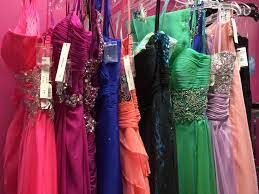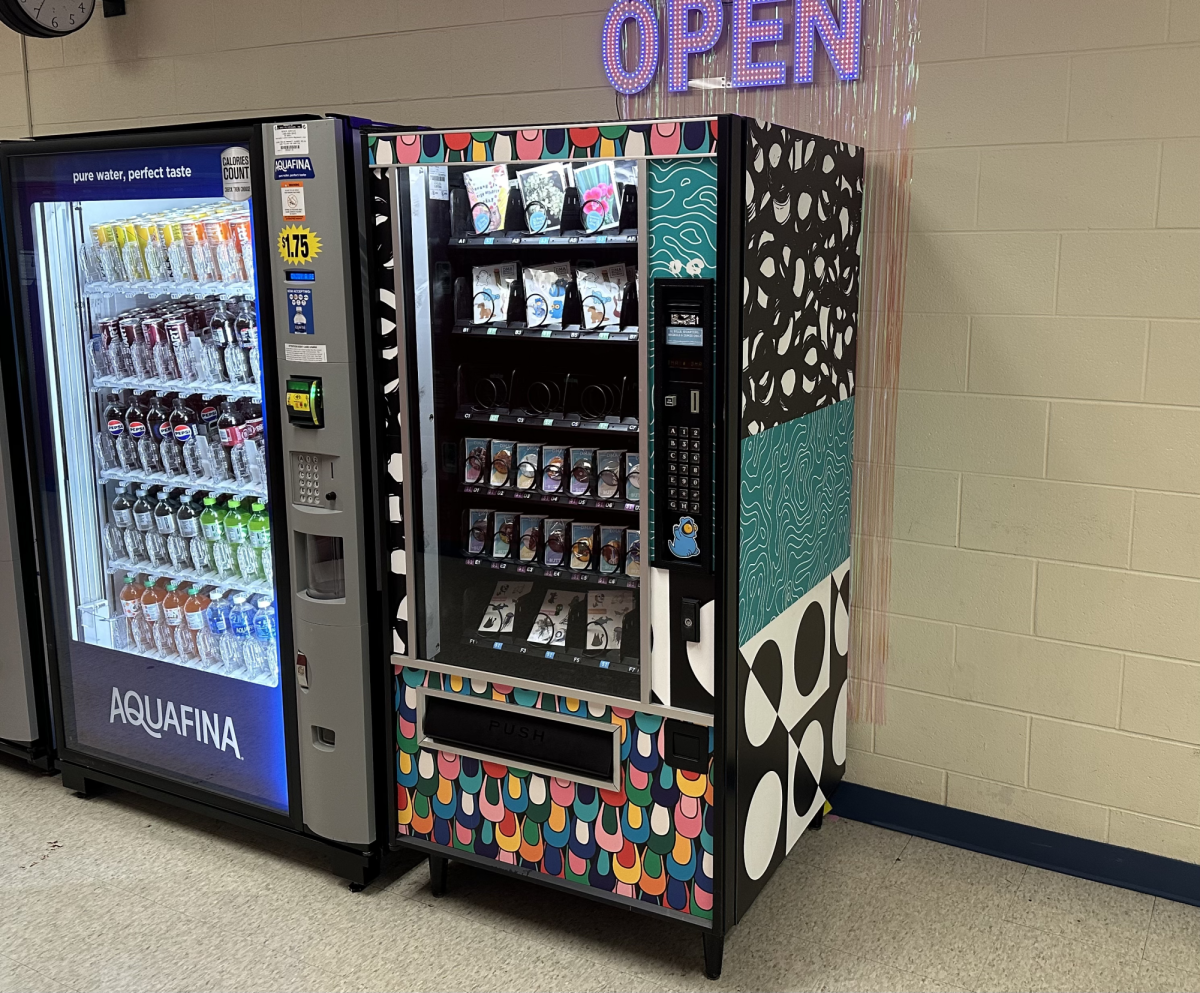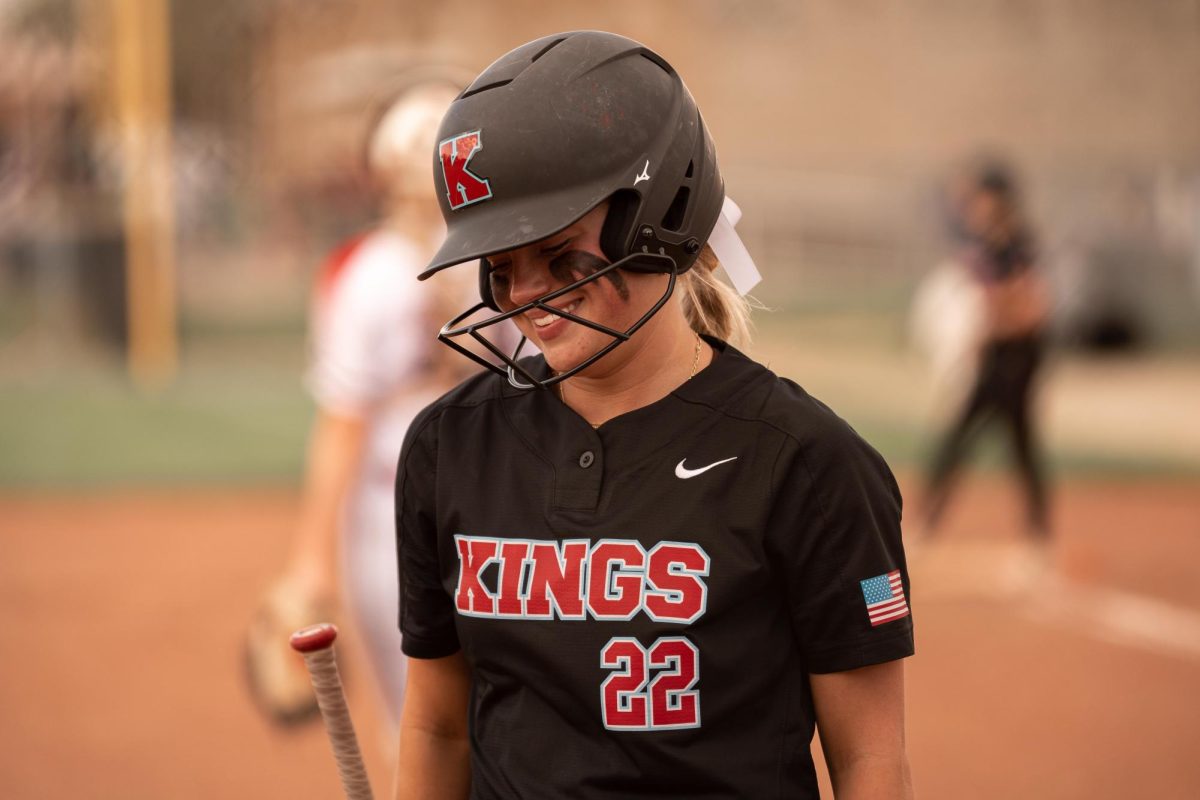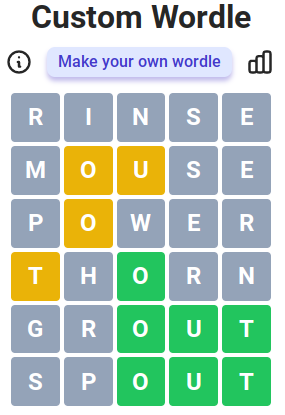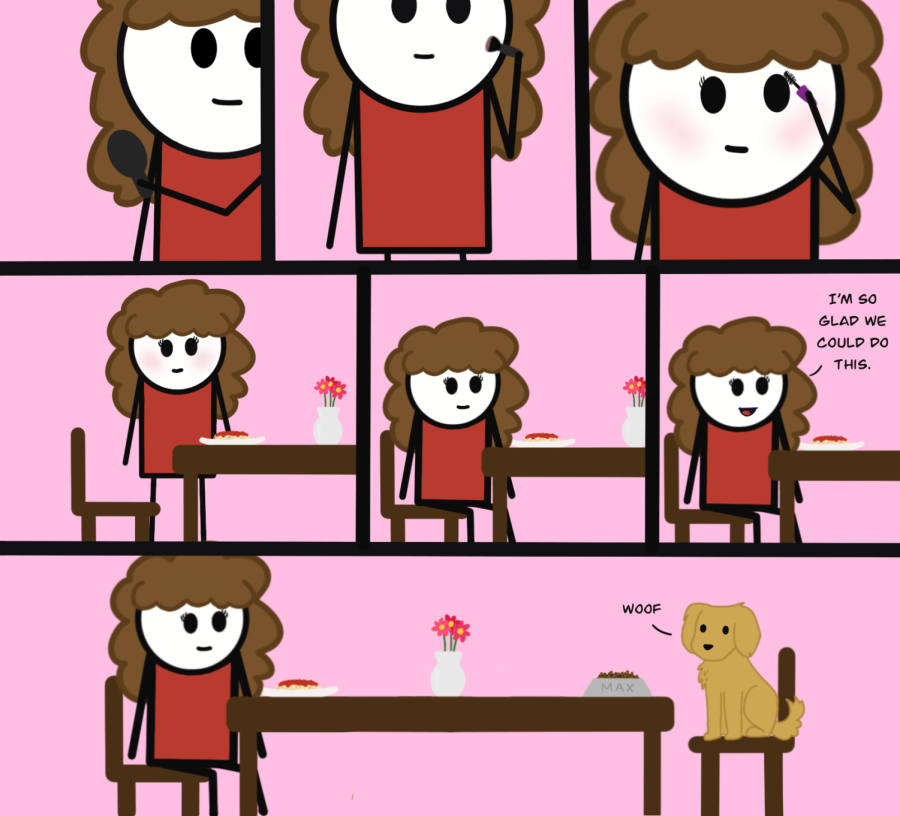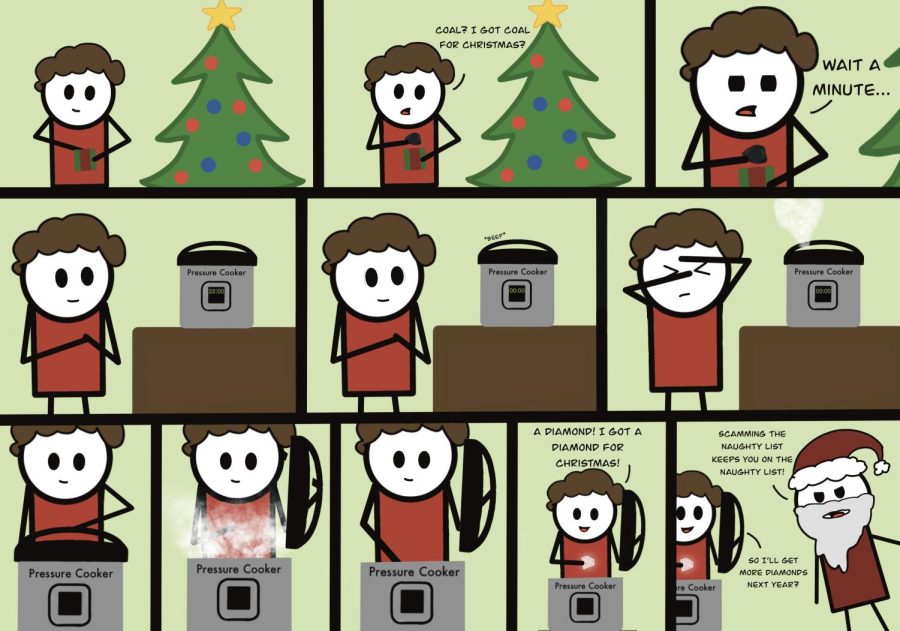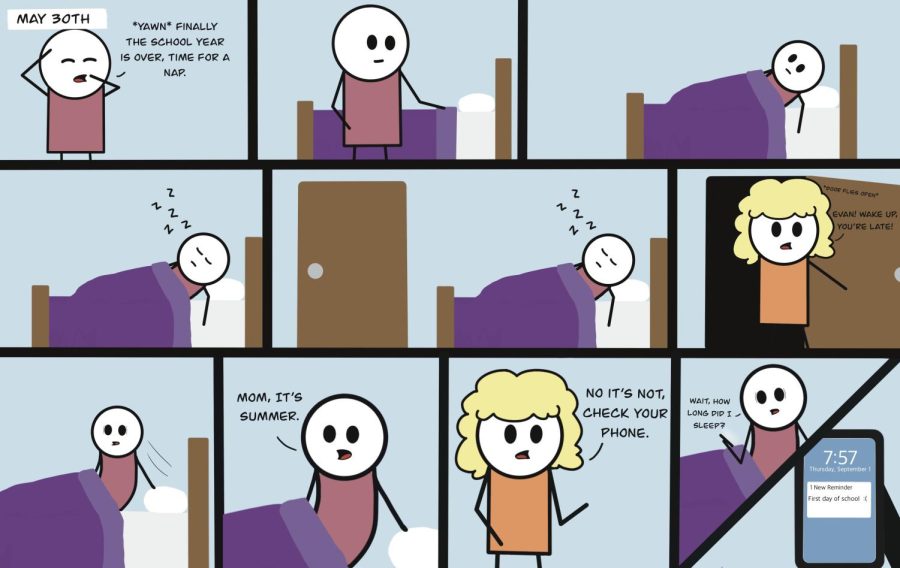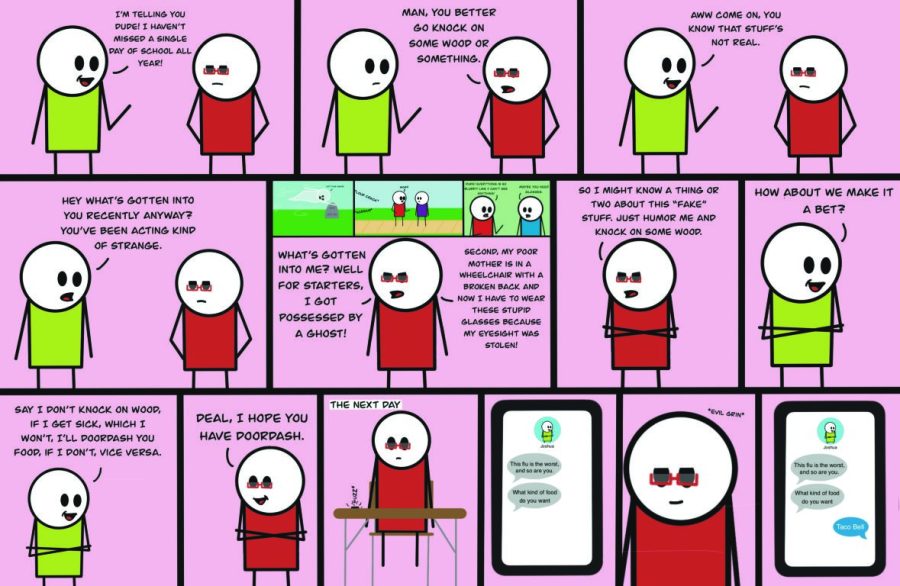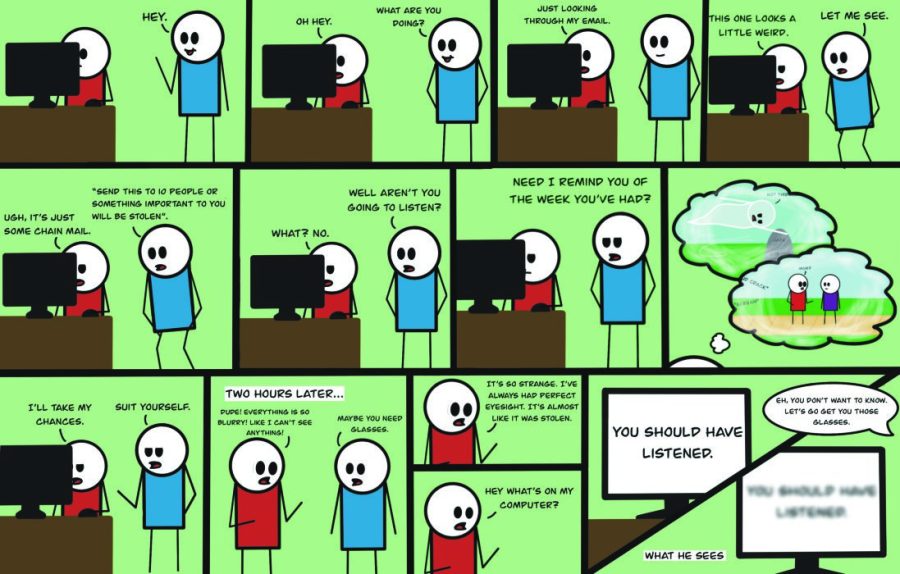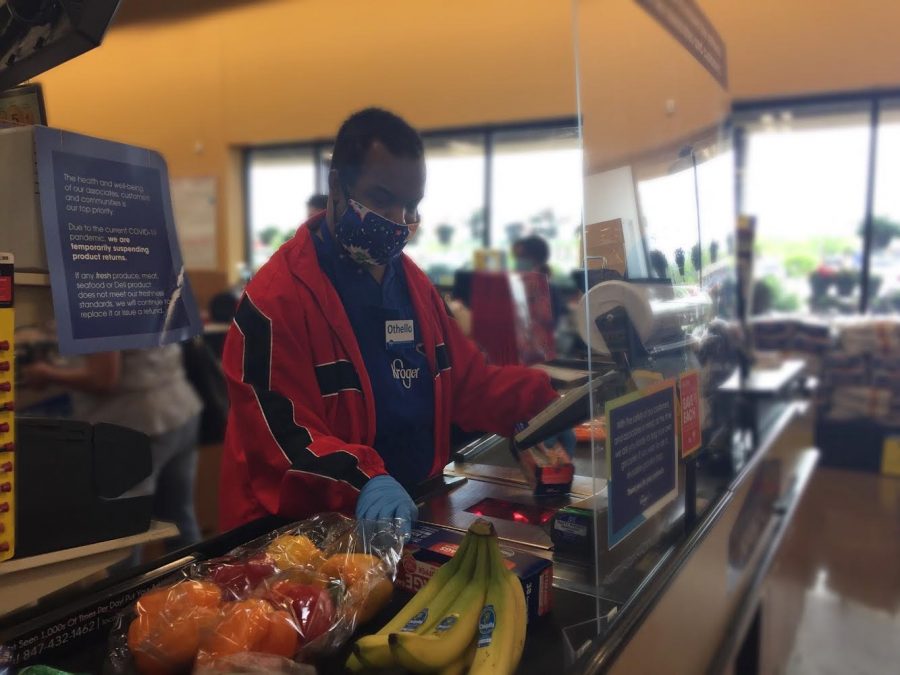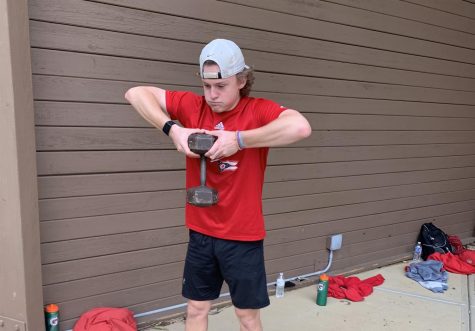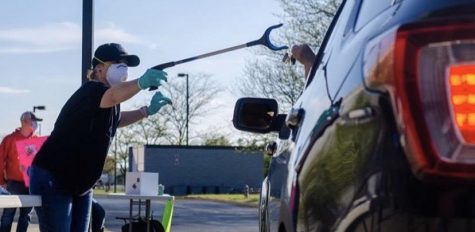Essential: Kroger employees share observations
Othello Gooden Jr., essential worker at Kroger, checks out customers using PPE.
“Time and tide wait for no man.” -Geoffrey Chaucer
Chaucer’s words have found themselves in my mind many times throughout the day. Every time I get in my car and drive to Kroger, where I currently work, I can not help but wonder when time will catch up with me. All of these protective measures I have taken—wearing gloves and a mask, washing my hands frequently, wiping down the inside of my car after work—seem to be delaying the inevitable. COVID-19 is here and it is still spreading fast. As Ohio begins to reopen, my fears begin to accumulate. When will I become a captive of this novel virus?
Essential workers hear these words every day: “thank you for being here”, “you are a hero”, “we appreciate everything you are doing.” But does it make a difference? It may make the well-wisher feel good, but it will not stop the virus from taking hold of thousands more. According to the Washington Post, thousands of grocery store workers have already tested positive, and dozens have died. Honestly, I am afraid of becoming one of those thousands of workers. Sometimes I wonder if I already have it and it’s too late. I also believe it is only a matter of time before an employee at my workplace tests positive.
My coworkers feel the same way.
“Even though we are taking precautions, there is still a possibility that someone can get it,” said Brendan Wright, a cashier at the Kroger where I work.
I believe workers at my store already have the virus. Many of us—especially cashiers, baggers, and stockers—come into contact with dozens, if not hundreds, of people a day. Since the Kroger I work at is one of the larger locations and is in a convenient spot right off the highway, it is a popular place to shop and is regularly busy. This is the perfect place for the virus to spread, and it only takes one infected person to do so.
“I would be surprised if we haven’t already [had an employee test positive]. I know a couple of people have had to self-quarantine until they can be tested,” said coworker Christina Phillips.
We all knew that our jobs wouldn’t be in jeopardy, because people have to eat. The three of us were surprised at how panicked people became when the virus started spreading in the region.
On March 12, Governor DeWine announced schools would be closing. I worked the next day, March 13, which was to be the last day at school for the rest of the year. People flocked to the grocery stores and began hoarding items such as toilet paper, cleaning supplies, and canned goods. In only a week we had completely run out of these items plus ground beef, eggs, sugar, and flour. Almost all of the milk and pasta were gone. Our store had to start putting limits on items, and as soon as we did so, customers became angry. Even with many signs around the store listing the items limited, people still tried to cheat the system by splitting the limited items into separate orders. We also had to take the hand sanitizer away from the registers because people kept trying to steal them.
“I didn’t really think much about it; I knew that people were going to be making it busy and giving me more work to do. But I knew that I would still have a job as well,” said Wright.
We all sanitize our hands more often. Everyone is required to wear a mask, a few wear gloves, and many clean their registers more often.
“[I] started wearing gloves and a mask and using hand sanitizer. I also changed the way I do things when I got home—like change clothes and shower immediately,” said Phillips.
We believe Kroger is at least trying to keep their employees and customers safe, but Phillips believes it will take time for the safety measures to be enough.
Wright believes the safety measures Kroger has taken are already enough to keep everyone safe.
“We have been setting up screens to avoid direct contact between the registers, we are being provided masks, and the amount of cleaning and sanitizing we do around the store,” said Wright.
Although the two agreed that Kroger is trying to keep customers and employees safe, both said that customers should also be required to wear masks. I also agree that customers need to wear masks. Wearing a mask is meant to protect others, not yourself. If some customers aren’t wearing masks and some are, there is still a high risk of spreading the virus.
For example, if a customer is asymptomatic but infected and is not wearing a mask, that person can still spread it to someone who is wearing a mask. If every customer and employee wears a mask, then the chances of the virus spreading is close to none. Unfortunately, if Kroger decides to make customers wear masks, many will try to violate this rule and we will have to have some form of security to ensure people follow the rules. This will also cause people to complain and may even cause some violence.
Many people who wear masks wear them wrong. I’ve seen people wear them upside down, only over their mouth, not molded to create an airtight seal, and take them off so they can hear me better. I don’t think I will ever understand why customers have a habit of pulling their masks down when I am talking.
“I would like to see us get [face] shields because some people really can’t breathe in the masks. I really believe the customer should have to wear a mask also!” said Phillips. “They(Kroger) need to close two of the six self scans on each self check out—the center two; that would help keep distance. Honestly, they need to clean the bathroom more and I think it would help to make aisles one-way! But like I said, I think it’s gonna take time because I feel like we’re gonna see a whole second wave.”
One thing that I find concerning is the customer limit. Currently, Kroger stores are limiting the number of customers by 50% of the occupancy limit set by each building’s fire code. Some Kroger stores that are larger have a limit of 1,000 people. The Kroger I work at has a limit of 803. I think this number is way too high and I don’t even think there are 803 carts. Both coworkers agreed.
“Our store has never had that many [people] inside at one time! I checked [and] the most we’ve ever had in a whole day is 3,000—that’s a whole 16 hour day!” said Phillips.
“I feel as if the limit is too high even when the stay at home order wasn’t a thing and COVID wasn’t a thing. We never got that many people in the store,” said Wright.
One thing circulating around essential employee’s lives right now is the word “hero.” Some customers thank us for working and call us heroes. At first I felt like a hero, but now I feel more like a victim than a hero. Essential employees never signed up for the job thinking they would have to risk their lives in a pandemic. Every essential employee was in a way drafted into this war. Although some have quit or taken unpaid leave, many cannot afford to stop working, so they are forced to work in a high-risk environment.
“Not a single person has called me a hero while I have been working, but when they say thank you it feels kinda nice knowing that I am doing something that helps people out,” said Wright.
In the end, employees are afraid. We are afraid to work because we could easily contract the coronavirus. Even with the safety measure in effect, the risk is high. With the state beginning the reopening process, more people are going to venture out, putting more essential employees at risk. All of this is out of our control, and all we can do is continue doing our jobs to the best of our ability and pray. For everyone else, the best way to thank us is by staying at home.
Want to show your appreciation?
Consider donating to The Knight Times!
Your proceeds will go directly towards our newsroom so we can continue bringing you timely, truthful, and professional journalism.

My name is Lauren Bush. Some of my hobbies are photography, playing acoustic and electric guitar, drawing or painting, and exploring outside in nature....



